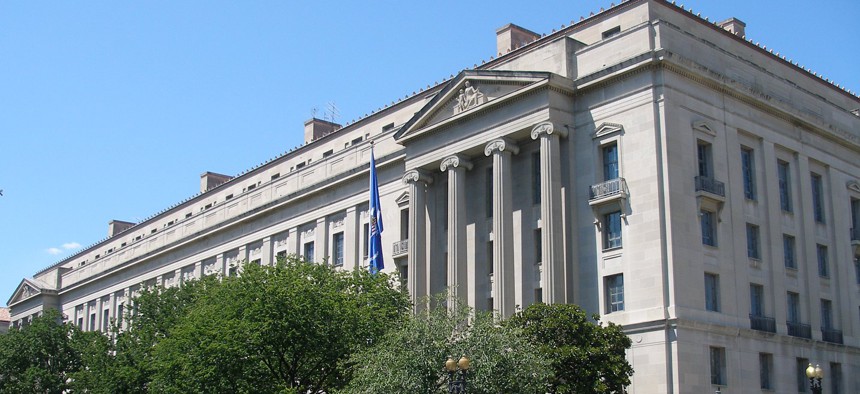
The Justice Department headquarters is housed in Washington D.C.'s Robert F. Kennedy Building Wikimedia Commons
Justice to Require Warrants for Cell Tracking Technology
The new policy does not apply to state and local police departments that have used cell-site simulators to track criminals.
The Justice Department said Thursday it will require its law-enforcement agents to get a warrant before using technology that tracks the location of cell phone users by posing as cellphone towers.
The cell phone-tracking technology, which sweeps up identifying information from every mobile device within range in order to find a target device’s location, has been met with criticism from privacy advocates who have raised concerns about the widespread data collection it makes possible.
Sometimes called Stingrays after a popular model used by law enforcement, the cell-site simulators operate by mimicking a cellphone tower and establishing connections with nearby devices searching for a cell signal. When devices connect to the simulator, they transmit identifying information. Police can single out a device and use the direction and strength of the signal to acquire its location.
The Justice Department has historically remained highly secretive about the technology, often pushing state and local police to stay silent about their usage of the simulators.
Stingrays do not receive GPS information, and may not be used to intercept communication to and from mobile devices, or the data stored on them, according to the Justice Department.
In addition to requiring warrants, the department also set data-retention and deletion standards, stipulating that all data must be deleted once the target of the cellular surveillance has been identified and setting up auditing programs to make sure the deletion standards are followed.
The policy applies to Justice Department law enforcement only, and does not extend to state and local police. According to records obtained by the American Civil Liberties Union, 53 agencies in 21 states and the District of Columbia own and operate Stingrays.
Privacy advocates hailed the announcement as a constructive step, but pointed out loopholes and shortcomings in the policy.
“Disturbingly, the policy does not apply to other federal agencies or the many state and local police departments that have received federal funds to purchase these devices,” said Nathan Freed Wessler, an ACLU staff attorney, in a Thursday statement. “In addition, the guidance leaves the door open to warrantless use of Stingrays in undefined ‘exceptional circumstances,” while permitting retention of innocent-bystander data for up to 30 days in certain cases.”
Advocates are pushing for legislation to require all law enforcement to obtain warrants for cell-site tracking technology. Proposals from Sen. Ron Wyden, and Reps. Jason Chaffetz and Darrell Issa, would require every police department to apply for warrants before using a simulator.
NEXT STORY: Donald Trump and the Price of Loyalty Oaths







